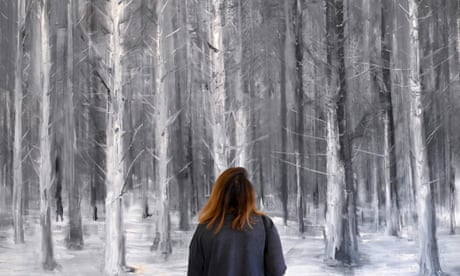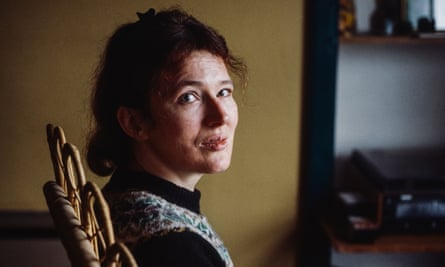I had not heard of most of these books, but now I want to find them.
1. The Juniper Tree by Barbara Comyns
Comyns opens with a few savage lines directly from the eponymous Grimm brothers’ tale: “My mother, she killed me / My father, he ate me.” From there, she artfully subverts the story’s basic events to address questions about race, class and depictions of single motherhood. Comyns crafts sentences with the hushed feeling of falling snow, and she begins with a chilly image, too: a woman outside in the winter, peeling an apple, who cuts herself. The reader knows what’s coming – that first drop of blood in the snow.
2. Her Body and Other Parties by Carmen Maria Machado
This groundbreaking collection of stories mixes in stinging splinters of fairytales . In The Husband Stitch, a woman strives in vain to keep her husband from untying the green ribbon around her neck. The original 17th-century tale becomes a funhouse of warped mirrors, the woman recognising something of her own futile striving in the fates of unlucky women throughout history. Like Comyns, Machado knows just when, and where, for the snip of the ribbon to happen, leaving the woman headless in the confounding era we’re living now.
3. Once and Forever by Kenji Miyazawa
Miyazawa’s stories recast tales from Japanese folklore. His funny, subtle retellings personify animals with amusing human insecurities and appetites. In one of my favorite stories, two boy crabs compete for the attention of their father until something unrecognisable swishes through the water. The crab children watch, unable to confess their fear until their father names the creature. Once they know what to call a fish, they find the nerve to name their fear aloud.
4. The True Story of Hansel and Gretel by Louise Murphy
Like Miyazawa, Murphy came to prose from poetry, as I did, and I suspect the embedding of fairytale images in fiction may have heightened allure to a poet-novelist, given the central role of imagery in a poem. Murphy’s haunting novel imagines the survival of Hansel and Gretel as Jewish children hiding in the forests of Nazi-occupied Poland. The “witch” who saves their lives has a large, secondhand oven, and Murphy gives her sly and compassionate witch the last page.
5. Gingerbread by Helen Oyeyemi
All of Oyeyemi’s brilliant, slippery novels draw from the well of fairytales. Like Murphy’s retelling of Hansel and Gretel, Gingerbread is a novel about dehumanisation and vulnerable children. Oyeyemi uses these stories to reflect on post-colonial immigration, the crumbs of opportunity left for immigrants stuck in dead-end factory jobs. The gingerbread here is one family’s enduring recipe, which one character describes as tasting of “the actual and anatomical heart of somebody who scarred your beloved and thought they’d got away with it.” Wolves, beware.
Angela Carter in the early 1980s. Photograph: Jane Bown/The Observer
6. The Bloody Chamber by Angela Carter
Carter translated fairytales and reading The Bloody Chamber alongside her translation of
Charles Perrault’s 17th century take on Bluebeard, her contrarian impulses, and the pizazz she brings to her images of the female body, become even more remarkable. Translation is an art of hidden mirrors as well, and it requires a similarly keen awareness of what connotations and cultural values readers will bring to the page.
7. The Complete Stories of Leonora Carrington
Carrington, like Carter, had a multilingual imagination. She wrote in French, Spanish and English, and the cadence changes slightly in the stories collected here depending on whether she was living at the time in Mexico or in France. The fairytale appetites of her female characters, their impulsive gobbling, for example, of raw rabbits are consistently audacious. The wildness that Carrington found in the primal visual language of those tales transcends any single idiom. I find even a single page of Carrington before breakfast provides me with a greater capacity for audaciousness all day.
8. There Once Lived a Woman Who Tried to Kill Her Neighbour’s Baby by Ludmilla Petrushevskaya
Petrushevskaya was born in Moscow under Stalin’s rule. Now in her 80s, she’s experiencing old age under Putin. In her brutal, beautiful fairytales, no wolves are ever sated for long. These are stories of appalling hungers, housing shortages. But Petrushevskaya’s characters laugh and have sex and enjoy each other’s company regardless. The dire circumstances of their lives in Soviet and post-Soviet Russia are not what moves the stories forward. Petrushevskaya is more inventive than that, and the English co-translations by Keith Gessen and Anna Summers are superb.

Top 10 forests in fiction
Read more
9. The Snow Child by Eowyn Ivey
In this Alaskan novel, a childless couple create one – out of snow. For anyone who lives with children who are not made of snow, the quiet, pristine world of this novel will immediately transport you to an elsewhere beyond the often loud and chaotic realm of 21st-century parenthood.
10. Hadriana in All My Dreams by René Depestre
Depestre draws from both Haitian folklore and fairytales in this magnificent novel. Kaiama Glover’s beautiful translation has a female character who gets to drink the Water of Eternal Life that’s usually reserved for royalty in the realm of fairytales. Except here the magic elixir is given to Hadriana, a woman in Haiti who sips it from coconuts she receives from an old man about to emigrate to Jamaica. He offers her more to drink and she senses in her soul the possibility of a second birth, of becoming herself anew.




